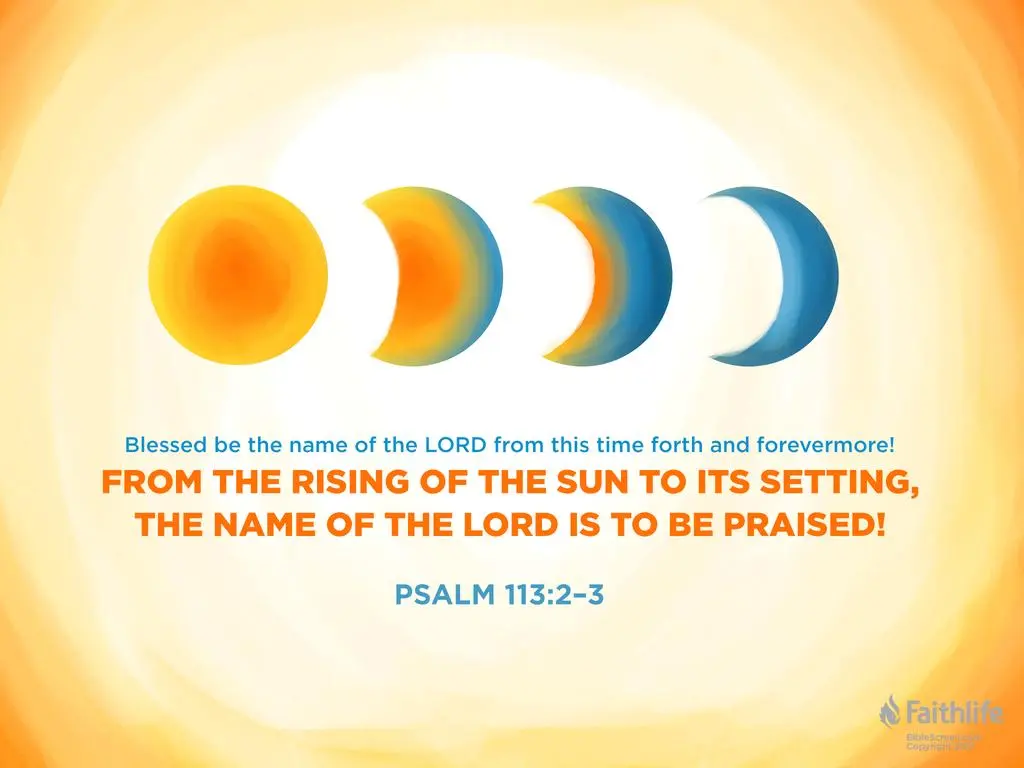Psalm 113

This Sunday, we will open our worship service with a responsive call to worship from Psalm 113. This psalm is the first of the Hillel psalms (113-118) which would have been sung each year at the Passover. In Matthew 26:30 and Mark 14:26, it says that Jesus and his disciples sang a “hymn.” That almost certainly refers to this sequence of psalms.
Psalm 113 is a call to praise God, and it lists several reasons to praise him.
Praise the LORD! Praise, O servants of the LORD, praise the name of the LORD! Blessed be the name of the LORD from this time forth and forevermore! From the rising of the sun to its setting, the name of the LORD is to be praised! The LORD is high above all nations, and his glory above the heavens!
Verses 1-4 tell us to praise God because he is creator. We praise him because he is sovereign over all things. He sets the sun in its place, and he establishes all the rulers of the earth. Nothing is outside of his control. This is certainly enough reason to praise him, but there’s more.
Who is like the LORD our God, who is seated on high, who looks far down on the heavens and the earth? He raises the poor from the dust and lifts the needy from the ash heap, to make them sit with princes, with the princes of his people. He gives the barren woman a home, making her the joyous mother of children. Praise the LORD!
Verses 5-9 tell us to praise God because he is our redeemer. Although God is high above all things, sitting on the throne of heaven, he does not remain unapproachable. In fact, he bends down from his throne to raise up the poor and needy. This is exactly what Christ did in his incarnation, “who, though he was in the form of God, did not count equality with God a thing to be grasped, but emptied himself, by taking the form of a servant, being born in the likeness of men” (Phil. 2:6-7).
We are the poor and needy, and he raises us up from the dust and ash by becoming dust and ash himself, i.e., by becoming man. He takes barren Israel, and makes her fruitful so that the children of God are multiplied with the gospel. He gives the church a home in heaven, and guards her from all danger.
When we worship each Sunday, we rejoice in this–that God is both creator and redeemer. This is how John Calvin summarizes this truth:
In this ruin of mankind no one now experiences God either as Father or as Author of salvation, or favorable in any way, until Christ the Mediator comes forward to reconcile him to us. Nevertheless, it is one thing to feel that God as our Maker supports us by his power, governs us by his providence, nourishes us by his goodness, and attends us with all sorts of blessings—and another thing to embrace the grace of reconciliation offered to us in Christ. First, as much in the fashioning of the universe as in the general teaching of Scripture the Lord shows himself to be simply the Creator. Then in the face of Christ [cf. II Cor. 4:6] he shows himself the Redeemer. (Institutes of the Christian Religion, 1.2.1)
Updates
-
Parents’ Fellowship is scheduled to meet again on April 28th (next Sunday) at 5 PM. We’ll be diving deep into what the Bible teaches about how to study the Bible.
-
Presbyterian Women will meet on Thursday, May 2, at 6:30 PM
Your friend in Christ,
Reid
